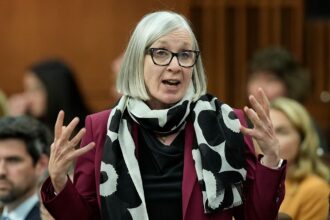In a tense exchange that highlighted growing tensions over Canada’s housing crisis, Housing Minister Sean Fraser repeatedly sidestepped direct questions Tuesday about the federal government’s unfulfilled promise to eliminate GST on purpose-built rental housing developments.
The confrontation occurred during a parliamentary committee meeting where opposition MPs pressed for clarity on when Canadians might see tangible action on a pledge made months ago. The government had announced plans to eliminate the Goods and Services Tax on these crucial housing developments as part of its strategy to address the nation’s severe housing shortage.
“What we’ve done is put forward a proposal that will make a meaningful difference in the lives of Canadians who are struggling to find an affordable place to call home,” Fraser stated, avoiding specifics on implementation timelines despite repeated questioning from Conservative MP Eric Duncan.
This exchange comes at a critical moment for the Liberal government, which has faced mounting criticism for the pace of its housing initiatives while affordability continues to deteriorate across the country. According to recent data from the Canada Mortgage and Housing Corporation, rental vacancy rates have plummeted to historic lows in major urban centers, with Toronto and Vancouver seeing rates below 1 percent.
The promised GST exemption would potentially save developers millions on new rental construction projects, theoretically enabling more units to be built at lower costs. Industry experts estimate the tax relief could reduce construction costs by approximately 5-7%, potentially translating to thousands of additional rental units annually if properly implemented.
“The housing crisis isn’t waiting for bureaucratic processes,” noted housing advocate Jennifer Morris of the Canadian Housing Coalition. “Every month of delay means more Canadians struggling with unsustainable housing costs or unable to find suitable accommodation at all.”
When asked about the specific timeline, Fraser pivoted to broader housing initiatives, pointing to the government’s Housing Accelerator Fund and other measures designed to increase supply. However, he offered no concrete date for when the tax exemption would take effect or whether it would be included in the upcoming fall economic statement.
The government’s housing strategy has become increasingly central to its political positioning ahead of the next election, with Prime Minister Justin Trudeau recently declaring housing affordability the government’s “number one priority.” Yet critics point to the widening gap between announcements and implementation as evidence of a disconnect between rhetoric and results.
Duncan’s frustration was evident as he pressed the minister: “Canadians don’t need more announcements or promises; they need action on the ground. When will they see the actual tax relief that was promised?”
The standoff underscores the complex political dynamics surrounding Canada’s housing crisis, with all major parties jockeying to position themselves as best equipped to address what has become one of voters’ primary concerns. Recent polling shows housing affordability consistently ranks among Canadians’ top three concerns, particularly among younger voters and residents of major urban centers.
Economic analysts suggest that while tax incentives represent one tool in addressing housing shortages, a comprehensive approach requires coordination across all levels of government to address zoning restrictions, permitting delays, and other regulatory barriers to construction.
“The GST exemption is just one piece of a much larger puzzle,” explained economist Priya Shah from the Canadian Centre for Economic Analysis. “Without addressing municipal approval processes and provincial land use policies, federal tax incentives alone won’t solve the fundamental supply constraints.”
As parliamentarians prepare for the fall session and the upcoming economic statement, the pressure continues to mount on the federal government to move beyond announcements to tangible action on housing affordability. The stakes extend beyond politics to the everyday reality of millions of Canadians struggling with housing insecurity.
What remains to be seen is whether the government can translate its housing promises into concrete results before voters render their judgment on whether rhetoric has matched reality in addressing one of Canada’s most pressing crises.







